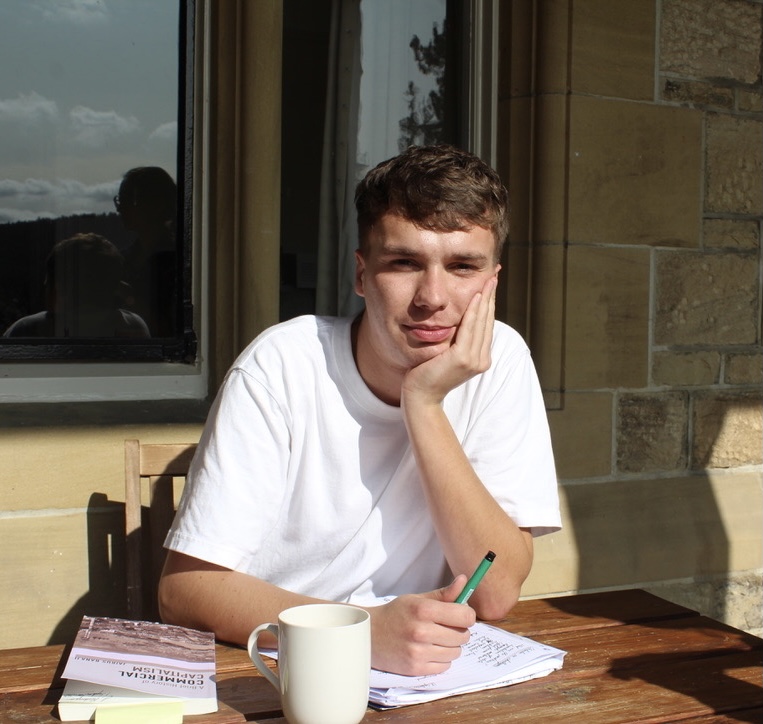Joe Redmayne
Joe Redmayne is a History research student. Joe's PhD is Militancy and Whiteness amongst the Working People of County Durham, 1919: A Multi-Occupational Approach.
Joe Redmayne is a second year History PhD student and interested in global labour history. In collaboration with Tyne and Wear Archives, his doctoral research situates County Durham during the year 1919 transnationally, and explores the global implications of Empire on British society through regional working-class consciousness.
Project title
Militancy and Whiteness amongst the Working People of County Durham, 1919: A Multi-Occupational Approach.
Supervisors
-
Dr. Matt Perry (Newcastle University)
-
Dr. Willow Berridge (Newcastle University)
-
Dr. Sarah Hellawell (University of Sunderland)
-
Rachel Gill (Tyne and Wear Archives)

Project description
The study situates County Durham during the year 1919 transnationally, exploring the global implications of Empire on British society through regional working-class consciousness. The year 1919 witnessed an unprecedented amount of industrial militancy and racial violence both globally and nationally. On 4 February 1919, a race riot targeting Arab seafarers took place in South Shields. During the same year similar riots occurred in Liverpool, Cardiff, Hull, Glasgow, London, Newport, Salford, and Barry.
Using County Durham as the scale of analysis permits consideration of wider debates regarding the ‘popularity’ or ‘absent-mindedness’ of Empire within British Society and the relationship between industrial militancy and racial violence. Furthermore, the category of ‘whiteness’ or ‘white labourism’ offers the potential to renew understandings of class consciousness in an age of world empires and to explore the exclusions of ‘others’ (women and non-white workers) in moulding class identities.
The thesis resists the temptation to assume homogeneity within County Durham’s working class(es), attending to its occupational diversity: miners, railway workers, engineers, patternmakers, boiler makers, dockers, shipbuilders, domestic servants, retail, warehouse, glass, and transport workers. Equally, it does not exclusively look for fracture, but rather explores the complexity of class identities and cross-occupational solidarities within the working class experience. By using Mikhail Bakhtin’s concept of thought and language as a social heteroglossia or ‘dialogue’, it will consider the extent to which working people managed to overcome the fissures in skill, occupation, gender, religion, nationality, white/black ethnicity and generation to produce a sense of class-consciousness in the region.
Qualifications
2019-Present: PhD, Newcastle University. Thesis title: “Militancy and Whiteness amongst the Working People of County Durham, 1919: A Multi-Occupational Approach.”
2017-18: M.A. with Distinction, History, Newcastle University. Thesis title: “The Post-War Labour Unrest 1919-1921: The Consolidation of Socialism and the transition from Syndicalism to Communism within the Durham Coalfield.”
2014-17: First class, B.A. (Hons), History, University of Sunderland. Thesis title: “The Great Labour Unrest 1910-1914: The Rise of Socialism and Degeneration of Liberalism in the Durham Coalfield.”
Awards
2019: AHRC Northern Bridge Consortium Studentship Award. A fully funded doctoral studentship for 3.5 years including a maintenance award at the UK Research Councils' national rate (currently £15,009 per annum). This award is in collaboration with Tyne and Wear Archives and Museums where I will undertake a 6-month placement.
2017: Ede and Ravenscroft Prize. I was awarded the Ede and Ravenscroft Prize and £125 for my high standard achievements and commitment on the BA (Hons) History programme at the University of Sunderland.
Previous Roles
Conferences
“The Global Challenge of Peace: 1919 as a Contested Threshold to a New World Order.” I chaired the “Colonial and Race” Panel, Newcastle University, 18 May 2019.
Papers
-
“NETWoRC Virtual Lunchtime Seminar Series, Spring 2021.” The paper (20 minutes) “The British maritime industry, 1914–19: split labour market theory, white labourism and colonial seafarers,” was presented to the North East Transnational and World Research Centre (NETWoRC), Northumbria University, 17 February 2021.
-
“Rebellion, revolution and resistance in the twentieth century: Social movements, class and political violence.” The paper (15 minutes) “Introduction to my thesis: Militancy and Whiteness,” was presented to the Labour and Society Research Group Workshop, Newcastle University, 4 October 2019.
-
“Global perspectives’: New and emerging work in nineteenth-century studies.” The paper (15 minutes) “Introduction to my thesis: Militancy and Whiteness,” was presented to The Centre for Nineteenth-Century Studies Postgraduate Conference, College of St Hilda and St Bede, Durham University, 5 July 2019.
- “NELHS First Tuesday Seminar Series.” The paper (45 minutes) “The Post-War Labour Unrest 1919-1921” was presented to the North East Labour History Society (NELHS) in Newcastle, 2 April 2019.
Workshops
“Virtual Workshop: New Approaches to the Contentious Politics of Class.” Colleague Katherine Waugh and I organised and hosted the workshop, 28–29 May 2021.
Work Experience
- 2019-Present: Part time, LSRG’s Social Theory Reading Group Assistant at Newcastle University, Newcastle.
- 2019-20: Part time, Postgraduate Forum Seminar Series Co-ordinator at Newcastle University, Newcastle.
- 2018-19: Part time volunteer, Researcher and Assistant Teacher at the Workers Education Association (WEA): NE History and Heritage Branch, Newcastle.
Professional Membership & Associations
- Newcastle Labour and Society Research Group (LSRG), member
- Newcastle Postcolonial Research Group (NPRG), member
- North East Labour History Society (NELHS), member
- Royal Historical Society (RHS), early Career Membership award
- Society for the Study of Labour History (SSLH), member
